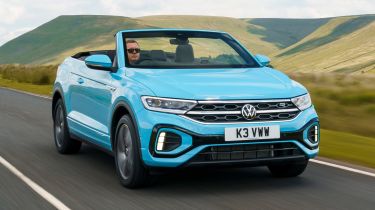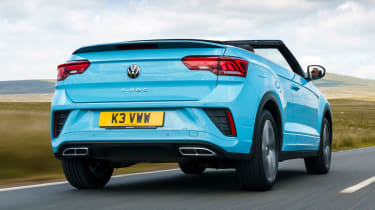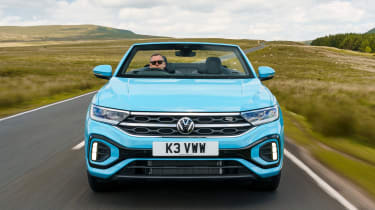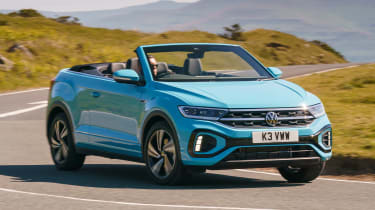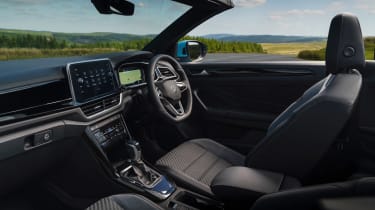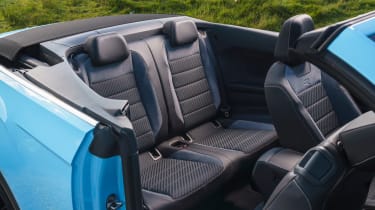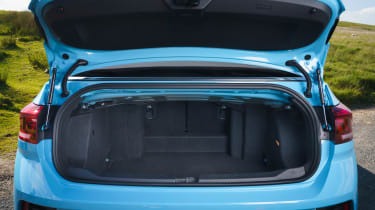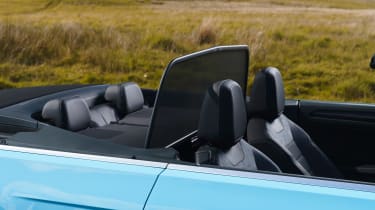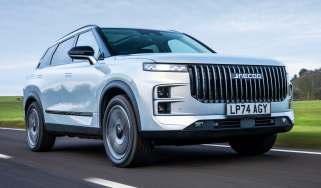Volkswagen T-Roc Cabriolet
“The Volkswagen T-Roc Cabrio is heavier, less economical and more expensive than the standard T-Roc”
Pros
- Plenty of kit
- Intuitive interior
- Roof-down driving
Cons
- Heavy
- Impractical
- Limited choice
If you were in any doubt about the popularity of SUVs and crossovers, the Volkswagen T-Roc Cabriolet will remove the uncertainty. As you might expect, the Cabrio is a convertible version of the T-Roc SUV, which is a similar size to the Volkswagen Golf and uses the same platform.
It’s Volkswagen’s only convertible currently on sale in the UK and effectively replaces the Volkswagen Beetle and Golf Cabriolet models. VW will hope the T-Roc Cabrio isn’t a niche too far, as it has no direct competitors and the last convertible SUV, the Range Rover Evoque Convertible, was discontinued due to poor sales.
Volkswagen shows no signs of shying away from it, because the T-Roc Cabriolet was given a thorough makeover for 2022, in line with the regular model. It offers more space than a MINI Convertible or Mazda MX-5, while slightly undercutting the BMW 2 Series Convertible and Audi A3 Cabriolet, and the combination of an upmarket badge, SUV body style and a folding fabric roof prove appealing to some drivers.
The regular T-Roc SUV will still be the bigger seller and the convertible is available in fewer trim levels as a result. Style, the mid-range model on the standard T-Roc, is the entry-level version here, with R-Line above it. Both trims get adaptive cruise control, dual-zone climate control and front and rear parking sensors, plus an eight-inch screen with DAB radio and smartphone mirroring. R-Line adds a sporty body kit, larger alloy wheels, lower suspension, an upgraded 10.25-inch digital instrument cluster and LED Plus headlights with separate LED daytime running lights.
More reviews
As is often the case with convertibles, the T-Roc Cabrio is noticeably heavier than the car on which it’s based. That’s not good for acceleration, handling or economy; there isn’t a fantastically economical version of the T-Roc Cabrio available given that no diesel or hybrid model is offered. You’ve a choice of a 109bhp 1.0-litre or a 148bhp 1.5-litre petrol engine, and we’d recommend the latter as its punchier acceleration better suits the T-Roc’s character. Both offer in the region of 44-45mpg, and the more powerful option is available with either a six-speed manual or a seven-speed DSG automatic gearbox.
The T-Roc isn’t the most practical SUV to start with, but its transition to a convertible has really affected versatility. Where the roof mechanism (taken from the Mk6 Golf Cabrio) is placed means the T-Roc Cabrio loses a seat – it’s now a strict four-seater, and those in the back aren’t blessed with acres of leg room either. Instead of a full-size tailgate, the boot opening is more of a postbox slot, and the boot is about a third smaller than the T-Roc’s.
While the loss in practicality won’t bother many buyers in the market for a convertible, we would still recommend choosing the hard-top SUV if you’re set on the T-Roc. The SUV is a stylish car and one that gives you more scope for personalisation. If you’re simply after a convertible, it’s hard to ignore the T-Roc Cabrio’s more premium and sporty rivals.
MPG, running costs & CO2
It seems that the T-Roc Cabriolet isn’t aimed at higher-mileage drivers, as Volkswagen isn’t offering a diesel or hybrid engine: but its petrol engines are still pretty frugal. You’ve a choice of two petrol engines shared with the T-Roc and other VW Group models; a 109bhp 1.0-litre and a 148bhp 1.5-litre engine with the ability to shut down half its cylinders to save fuel. The 1.0-litre, only offered with Style spec, achieves up to 44.8mpg, while the 1.5-litre manages exactly the same figure, but costs around £1,500 more to buy. It’s worth noting that choosing R-Line spec – or the automatic gearbox – reduces the fuel economy slightly, but neither are exactly deal breakers.
After the first year’s VED (road tax), which is included in the cost of the car, the T-Roc Cabrio will cost the standard rate every year, so long as you keep the purchase price under £40,000. The 1.0-litre engine has the lowest Benefit-in-Kind (BiK) rate for company car drivers. Like every Volkswagen, the T-Roc Cabrio gets a three-year, 60,000-mile warranty but both the BMW 2 Series Convertible and Audi A3 Cabriolet don’t have a mileage cap. Volkswagen also offers buyers a two-year service plan, which can be paid monthly.
Engines, drive & performance
Some convertibles, including the Mazda MX-5 and MINI Convertible, pride themselves on their driving experience but we can’t say the same about the T-Roc Cabrio. The T-Roc SUV already has rivals that are better to drive and removing its roof has made matters worse. There’s not much feel in the steering – although it is at least quite precise – and the extra weight blunts performance.
There are just the two petrol engines on offer. You can choose a 1.0-litre three-cylinder engine with 109bhp with the Style trim, but its 12.3-second 0-62mph time isn’t really competitive, especially considering how much the T-Roc Convertible costs. We’d recommend upgrading to the 148bhp 1.5-litre engine because its extra power makes acceleration and overtaking much less of a chore. It’s not what you’d call brisk, though; 0-62mph takes 9.4 seconds in the manual, while the same engine in the Volkswagen Golf is over a second quicker.
Interior & comfort
Convertible cars often let lots of wind noise and buffeting into the cabin, but the T-Roc is very good in this respect when you’ve got all four windows up. We don’t think you need to pay for the expensive optional wind deflector (£350), that also makes the rear seats inaccessible when it’s in use. There’s only a small amount of the rattling you can get in some convertibles, and on the whole build quality is good. Like the regular T-Roc, the materials used in the cabin have been upgraded slightly for the facelift, so there’s less cheap-looking plastics on the dashboard in particular.
While driving sparkle won’t be the top priority for many buyers, the car’s ride is likely to be more important. The suspension has been softened slightly for the facelift, but the Convertible still fidgets slightly more than the T-Roc SUV over most surfaces.
Still, with the T-Roc Cabrio only offered in more expensive trim levels, there’s a decent array of equipment thrown in. The Style trim includes sat nav, adaptive cruise control, dual-zone air con, all-round parking sensors, auto lights and wipers, DAB radio and Apple/Android connectivity. R-Line brings sporty looks, plus upgraded LED headlights and a different daytime running light design, a 10.25-inch digital instrument cluster, Driving Profile selection and suede-style inserts for the front and rear seats.
The options list is tempting but you can end up spending much more than the list price. It’s a little disappointing that a reversing camera (£300) and keyless entry (£400) aren’t included even on the top model, while adjustable suspension costs around £1,000.
Practicality & boot space
Becoming a convertible means the T-Roc Cabrio is much less practical than the regular T-Roc SUV, which itself isn’t the most versatile car in its class. For a start, the roof mechanism means there’s no room for a middle rear seat, and the two remaining rear seats are pretty cramped. They’ll be fine for kids, or for adults on occasional short journeys, while headroom is slightly compromised by the folding roof. The roof is exceptionally fast, though, taking just nine seconds to lower, at speeds of up to 19mph.
As you might expect, the boot is also much smaller than in the T-Roc SUV. Measuring up to 284 litres, it’s on a par with the BMW 2 Series and Audi A3 convertibles with their roofs down – but both offer around 50 litres more when the roof is up, despite their more low-slung styling. The T-Roc’s boot is fine for everyday use, but won’t easily accommodate a pushchair, holiday bags or flatpack furniture, in part because of its small opening. Families might struggle to have the T-Roc Cabrio as their only car. The rear seats do fold, so there’s a little more luggage capacity available when you need it. You can tow up to 1,300kg and 1,500kg with the 1.0-litre and 1.5-litre engines respectively, while a towbar costs around £700.
Reliability & safety
The Volkswagen T-Roc has been on sale for a couple of years now and uses many parts shared with other VW Group cars, so reliability shouldn’t be too much of an issue. The Cabrio’s convertible roof mechanism has seen previous service in an older Volkswagen Golf, too. VW came 18th out of 29 manufacturers in our 2022 Driver Power survey, with 19% of owners reporting a fault in the first year. The T-Roc SUV came 34th out of the top 75 models, with an above average score for reliability and build quality. However, owners were less keen with how the car drives, placing it 74th in this category.
The T-Roc’s five-star Euro NCAP rating applies to the T-Roc Cabrio, even though every panel behind the front wheels is new. Standard safety features include lane-keeping assist, driver fatigue detection, a rollover protection system and auto emergency braking, plus all the usual airbags and traction control.
Which Is Best?
Cheapest
- Name1.0 TSI 115 Style 2dr
- Gearbox typeManual
- RRP£35,405
Most Economical
- Name1.0 TSI 115 Style 2dr
- Gearbox typeManual
- RRP£35,405
Fastest
- Name1.5 TSI R-Line 2dr DSG
- Gearbox typeSemi-auto
- RRP£41,240

